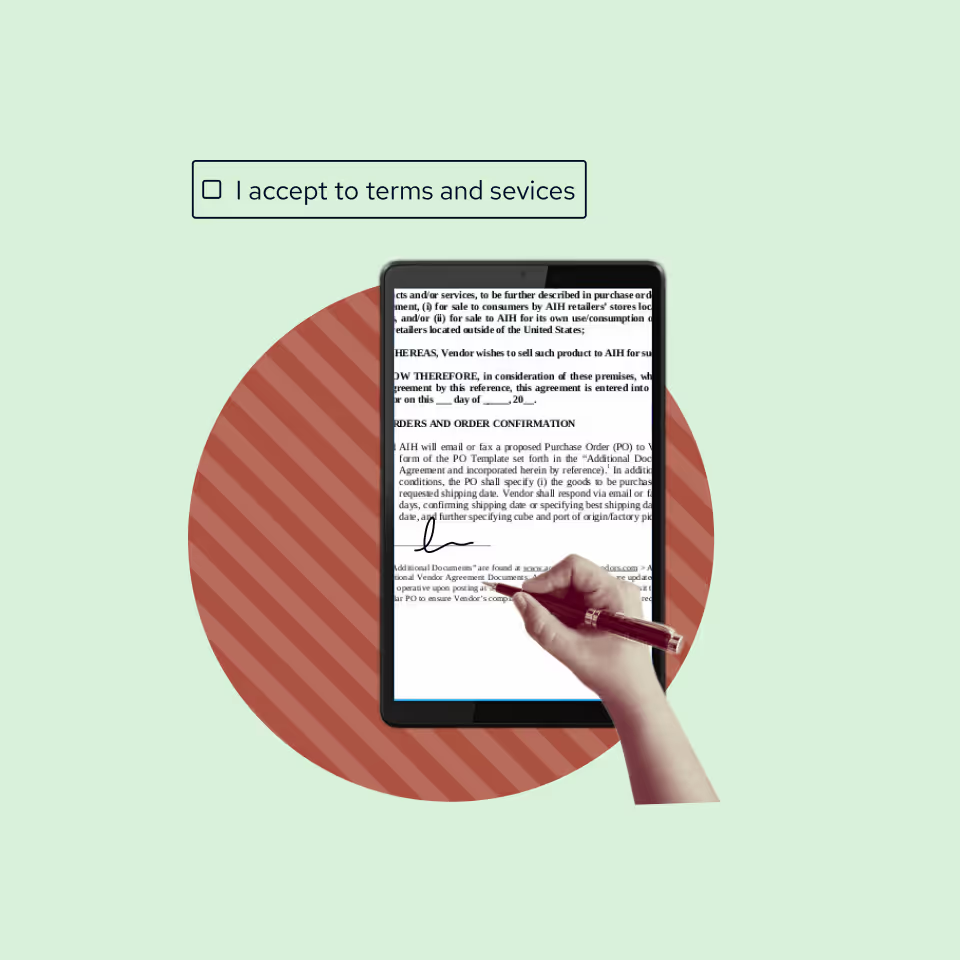Imagine finding your sensitive contract data breached! It's a nightmare for any in-house counsel.
The good news? It's easily preventable with a CLM, especially one with the right security features.
But what makes a CLM platform truly secure?
In this article, we'll explore just that:
- Must-have security integrations
- Advanced user authentication processes
- Advanced encryption methods
- Robust access controls
…and a lot more on how to choose the right tool for your team. Let’s dive in!
What is contract security?
Contract security is a group of processes designed to protect the data your company stores with regard to contracts.
This includes sensitive information regarding your company’s agreement with third-party suppliers and clients, as well as the personal data of each of your contracted employees.
A key focus of contract security is to ensure that contract information is only able to be accessed by the required or eligible team members.
However, it also covers diverse undertakings:
- Implementing appropriate contract handling procedures
- Assessing risk when working with new software platforms and integrations
- Building automated workflows to reduce human error
- Encrypting and protecting data with relevant and modern protocols
Contract security is not a job or role. It’s something that every person who works within legal—as well as those who touch contracts (such as sales and human resources employees)—is involved in.
Also read: The Ultimate Guide to Contract Management Security
Why is contract security important?
Contract security is important not only because of its scope but because of the myriad consequences that occur when contract data is not secured and managed effectively.
“You can either be part of the cleanup crew or do stuff to avoid that cleanup situation altogether.”
~ Gitanjali Pinto Faleiro, General Counsel, Company Secretary & CCO at Greenhill & Co.
Navigating the C-Suite as a GC
#1 Protecting your organization’s sensitive data
The first reason contract security is vital is that it helps to protect your company’s sensitive information.
This includes data such as the following:
- Internal processes
- Pricing and agreements
- Personal information of employees
- Service level agreements
#2 Ensuring the protection of the data of people you work with
Good contract data management is not just about protecting your own information but those of the external parties that you work with.
This includes your customers, as well as the suppliers and vendors you purchase from.
#3 Maintaining compliance with local and international legislation
Finally, strong contract security protocols help you to make sure your company is compliant with the various legislation to which it must adhere.
For example, many organizations are concerned with maintaining compliance with the General Data Protection Regulation (GDPR).
Also read: What is Contract Compliance? The Ultimate Guide
10 top features to look for in contract security platforms
Before you sign on the dotted line and onboard a contract security solution, take note of these ten features to prioritize.
#1 Cloud-based infrastructure
Choosing a cloud-based contract management system gets your data out of singular devices like desktops or laptops and into a secure cloud.
While this may sound like a security risk to some, the truth is that contract management solutions take data security, meaning they’ll prioritize cloud-based servers with the best data encryption.
Also read: Guide to Choosing and Using Cloud Contract Management Software
#3 Data encryption
Choose a secure software solution that adheres to state-of-the-art data encryption standards. Look for FIPS-140-certified encryption solutions and the ability to configure the tools to meet eIDAS attestation standards on demand.
#3 Native eSignatures
Great contract management solutions are more than just a secure contract repository. They also support the wider contracting process, such as signing and redlining.
However, some solutions don’t offer eSignatures natively, meaning you’ll have to contract a third-party tool.
This may not be a problem in and of itself (apart from the additional cost), though it does mean bringing in one more tool, one more integration, and one more set of contract security risks.
Better instead to choose a solution with eSignatures built right in.
Also read: The 11 Best Electronic Signature Software Platforms for 2023
#4 Security certifications
Look for a contract software platform that can provide proof of security certification, such as SOC 2 Type II and ISO 27001.
These certifications ensure that your critical information is stored in data centers that meet the latest international standards for security, helping you reduce overall risk.
#5 Automated workflows
While workflow automation is more widely considered a solution for saving time and money, there is a security component involved.
That’s because automation reduces the risk of data breaches through human error, and ensures that agreements are only ever delivered to those who should be accessing them.
“First, build out a workflow considering all the risks involved. Conduct training sessions with stakeholders and ensure they are comfortable using the CLM tool. The next step is to create a speck document with clause variations in different scenarios. Train the growth teams to refer to the speck document and make necessary changes to the contract, as needed."
~ Nadia Louis Hermez, Legal Ops Manager, Next Insurance, Inc.
Building a Robust Legal Ops Function
#6 Testing and auditing
When weighing up contract management solutions, ask about vulnerability and penetration testing.
These two kinds of tests are self-administered and are designed to find the weak spots in security systems so the company using them can make improvements to cybersecurity.
Find out what kind of tests a solution runs and how often.
In addition to internal testing, a good contract solution should subject itself to regular external auditing to eliminate the possibility of bias impacting tests of security standards.
Often, this happens during SOC 2 certification, though ongoing audits are a positive thing.
#7 SSO and MFA
SSO (single sign-on) permits a user to log into several platforms with one set of credentials and is a highly requested functionality, especially by enterprise customers.
Multi-factor authentication (MFA), often known simply as two-factor authentication or 2FA, requires users to sign on with more than just a password. The platform sends a code to an authentication app, mobile number, or email address as a second security check.
Both SSO and MFA are important for improving contract security.
#8 Role-based and individual user permissions
Access control is a critical facet of contract security. A good contract management solution should allow you to restrict who has access to what content.
You’ll want to be able to do this on an individual basis, as well as at the role level. For example, you might allow all sales team members to access client contracts but not give them the ability to see employee agreements or edit contract templates.
#9 Audit logs and version history
The ability to view an audit trail of changes to a given document, as well as a history of the different versions that have been in play, is important not only for running contract management audits but also for investigating and solving security issues if (and when) they arise.
Also read: Ensuring Contract Version Control: Best Practices to Streamline Legal Operations
#10 Business continuity and disaster recovery programs
Finally, look for a contract management solution that saves multiple data backups and has effective business continuity and disaster recovery programs in place to ensure services remain uninterrupted or are easily recoverable in the case of a disaster.
How to choose the right tool for your team
Aside from choosing a tool that ticks all of the above boxes, how should you approach wading through the myriad options you have when it comes to picking a CLM?
You keep these five factors top of mind:
#1 Non-negotiable features
First, make sure a given software platform includes all of your non-negotiable features.
The ones listed above are a good starting place, but you might not need them all right now. For instance, native eSignatures might be a non-negotiable, but maybe you can do without single sign-on.
If a given solution doesn’t meet all of your must-haves, cross it off your list.
#2 Scalability
Second, how scalable is the platform in question?
That is, is it cost-effective now, with all of the features you require as a small organization? And does it offer the ability to add more advanced functions through a plan upgrade as your company grows and requires more from the solution (like single sign-on or two-factor authentication)?
#3 Budget
Third, does the CLM tool fit within your budget?
Look not only at your current budget but at how much the tool will cost as you scale up. Many platforms charge per user, meaning your total investment will increase as your team grows.
Consider things like onboarding and implementation costs, overage charges, and any fees associated with accessing customer support.
#4 Customer support service
Be sure to choose a software solution that offers sufficient and efficient service levels from the support team.
You’ll likely want some help from support as you get accustomed to the tool, and it's always smart to have easy access to technical assistance in case something goes wrong.
Look at customer reviews for an indication of how well the support team functions. Then, ask questions like the following:
- Is the support team available 24/7?
- Do we get a dedicated support rep or account manager?
- What channels are available for support (e.g., chat, phone, email, video)?
#5 Local legislation compliance
Finally, make sure that any contract solution you choose helps you abide by location legislation.
For example, if you’re doing business in Europe, you’ll need to ensure that customer data is stored in data centers based in Europe. Or, if you’re selling in India, you’ll want to choose a tool that supports Aadhaar eSign
Download the guide: How to Buy a Contract Lifecycle Management (CLM) Platform that Actually Works for you
Manage contract security with SpotDraft
Choosing a contract solution is clearly an important step for helping your legal team safeguard company data.
Modern CLM platforms now include a wide variety of security features that improve data privacy. This includes protected smart repositories, eSignature capabilities, and reporting insights on performance.
While there are plenty of great solutions on the market, it's important to prioritize a solution that offers all 10 of the features discussed above.
Schedule a demo with one of the SpotDraft team, we tick all of those boxes and more.
You can also download our guide to learn more: How to Buy a Contract Lifecycle Management (CLM) Platform that Actually Works for you.







